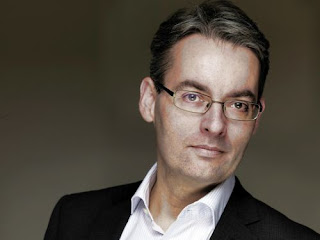Composer: Hans Pfitzner; Walter Braunfels
- (01) Pfitzner - Piano Concerto in E flat major, Op. 31
- (05) Braunfels - Tag- und Nachtstücke, Op. 44
Markus Becker, piano
Rundfunk-Sinfonieorchester Berlin
Constantin Trinks, conductor
Date: 2019
Label: Hyperion
----------------------------------------------------------------------------
One key aspect of Pfitzner’s endlessly fascinating Piano Concerto that immediately strikes home is its harmonic richness, especially with respect to modulation: beam up 11'34" into the first movement and follow the music through for at least a couple of minutes, noting during the journey just how far Pfitzner is taking you. In an interesting booklet note for this release, Nigel Simeone suggests parallels with Brahms and Reger, principally relating to tone and scale but also, in the case of the Brahms, the inclusion of an added scherzo movement. The real contrast as I see it is that Pfitzner’s chattering Heiterer Satz is more a genuine scherzo than Brahms’s headstrong Allegro appassionato, with Markus Becker rather more fleet of finger than Tzimon Barto on what’s surely the best rival version, recorded live in Dresden with Pfitzner devotee Christian Thielemann conducting. What this movement most puts me in mind of, both in mood and its placement within the overall scheme of things, is the second movement of Busoni’s Concerto (1901 04; Pfitzner’s Concerto dates from 1922).
The lovely third movement suggests further parallels, most obviously with the sublime beauty of Pfitzner’s operatic masterpiece Palestrina but turning again to Brahms’s Second Piano Concerto, the latter’s slow movement, especially the piano-writing from 3'27" (the soloist’s first entry). Here Becker is the restrained classicist against Barto the romantic, whereas in the finale’s opening pages he’s the more playful of the two, lending the music a delectable lilt (just as he did to Reger’s finale – AVI Music, 5/19). Prior to the concerto’s close there’s a virtuoso cadenza where both pianists deliver handsomely.
If pressed to choose I’d opt for Becker and Trinks, principally because of the way they balance the sum of the concerto’s substantial parts, and their generally superior recording. Also, don’t forget Walter Gieseking’s grandly stated wartime performance – Gieseking was a noted champion of the piece.
As to couplings, Thielemann chooses Busoni’s Symphonic Nocturne and Reger’s memorable Romantic Suite for a two CD release that, as Guy Rickards pointed out in his favourable review, could easily have been accommodated on a single disc. Hyperion interestingly treats us to what I presume is the first commercial recording of Walter Braunfels’s five-movement Tag- und Nachtstücke ‘for orchestra with piano obbligato’, music that dates from the early 1930s but wasn’t actually performed until summer 2017 (under Peter Ruzicka). Like most of Braunfels’s music that I’ve heard, it suggests a combination of profundity and play, being thematically pleasing, consistently inventive and very skilfully scored. There are times when the composer hints at progressive climes that Pfitzner doggedly resisted (Mahler is a distant presence), which makes Hyperion’s decision to place it alongside the concerto particularly valuable. An extremely fine release.
-- Rob Cowan, Gramophone
----------------------------------------------------------------------------
Hans Pfitzner (5 May 1869 – 22 May 1949) was a German composer and self-described anti-modernist. His best known work is the post-Romantic opera Palestrina, loosely based on the life of the sixteenth-century composer Giovanni Pierluigi da Palestrina. Pfitzner's music, including pieces in all the major genres except the symphonic poem, was respected by contemporaries such as Gustav Mahler and Richard Strauss. His works combine Romantic and Late Romantic elements with extended thematic development, atmospheric music drama, and the intimacy of chamber music. Pfitzner's students included musicians such as Otto Klemperer, Charles Münch and Carl Orff.
https://en.wikipedia.org/wiki/Hans_Pfitzner
https://en.wikipedia.org/wiki/Hans_Pfitzner
***
Walter Braunfels (19 December 1882 – 19 March 1954) was a German composer, pianist, and music educator. Composing music in the German classical-romantic tradition, Braunfels was well known as a composer between the two World Wars but fell into oblivion after his death. There is now something of a renaissance of interest in his works. His opera Die Vögel, based on the play The Birds by Aristophanes, was recorded and has been successfully revived. Braunfels composed music in a number of different genres, not only operas, but also songs, choral works and orchestral, chamber and piano pieces.
https://en.wikipedia.org/wiki/Walter_Braunfels
***
https://en.wikipedia.org/wiki/Walter_Braunfels
***
Markus Becker (born 1963) is a German pianist. Becker studied with Karl-Heinz Kämmerling and gained additional inspiration with Alfred Brendel. In 1987 he won first prize at the international Brahms Competition in Hamburg, followed by numerous awards in Germany and abroad. He has been a Professor at the Musikhochschule Hannover since 1993. Following his acclaimed CD debut with the F sharp minor Sonatas of Johannes Brahms and Schumann and further recordings for harmonia mundi and EMI classics, Markus Becker recorded the first complete edition of Max Reger's piano works for Thorofon.
https://markusbecker-pianist.de/
https://markusbecker-pianist.de/
----------------------------------------------------------------------------
FLAC, tracks
Links in comment
Enjoy!




Choose one link, copy and paste it to your browser's address bar, wait a few seconds (you may need to click 'Continue' first), then click 'Skip Ad' (or 'Get link').
ReplyDeleteIf you are asked to download or install anything, IGNORE, only download from file hosting site (mega.nz).
If MEGA shows 'Bandwidth Limit Exceeded' message, try to create a free account.
http://hadsucma.com/bmp
or
https://uii.io/rA2RO
or
https://exe.io/sMxsR4uP